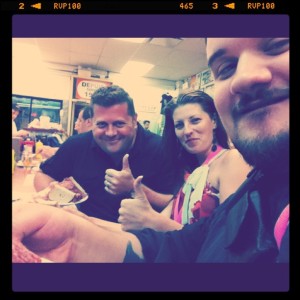Make the cloud work for you.
Archive for the ‘ business development ’ Category
LOL! Openera @Startupfest in Montreal
“Hey, do you want to go to Montreal for a couple of days and hang with a bunch of start-ups?”
That was my intro to the idea of the first International Startup Festival in Montreal. We weren’t really sure what to expect, but it definitely seemed like an event a bootstrapping startup should be at, if for no other reason than to connect with other startups and share ideas, pains, and opportunities.
Great Event.
Wow. What a fantastic event! StartupFest certainly didn’t disappoint.
 We had the opportunity to hear from serial entrepreneurs who put us at ease that we’re not alone in this, and yes, startups are hard, but that doesn’t mean we should give up (even if it did seem like they were encouraging us to run away as fast as we can!) We gained incredible insight into the The Lean Startup Model, validating that we’re on the right path, and approaching things the right way. We had the fortuity of learning what VC’s and angels are looking for, and what to do, or not do, when seeking funding.
We had the opportunity to hear from serial entrepreneurs who put us at ease that we’re not alone in this, and yes, startups are hard, but that doesn’t mean we should give up (even if it did seem like they were encouraging us to run away as fast as we can!) We gained incredible insight into the The Lean Startup Model, validating that we’re on the right path, and approaching things the right way. We had the fortuity of learning what VC’s and angels are looking for, and what to do, or not do, when seeking funding.
Here are some highlights of Startup Fest.
Here are our highlights from Startup Fest!
Adam Daw is a Hack! Officially.
Openera kicked off our activities at StartupFest with our hacker-in-residence, Adam Daw (@adamdaw), competing at Context.io‘s hackathon at Notman House, and wouldn’t you know you know it – he took first place!
Adam Daw, you are a Hacker! What better way to kick things off for us – congratulations Adam! (enjoy the iPad!)
We knew right away…
…this conference was F*@%!ng Different!
There was certainly no shortage of amazing presentation from some incredible speakers. While Dave McClure ( http://500startups.com) (King of the F-bombs!) may have had entrepreneurs and founders curled up in the fetal position crying for mommy with his in-your-face keynote “Why *NOT* do a Startup” (I especially love the term “Wantrepreneur”), thankfully it wasn’t enough to make us run away screaming. Here are just a handful of presentations we attended that had a huge impact on us, as well as links to the decks on SlideShare where available:
“Startups are hard, but don’t give up”
Sarah Prevette‘s awesome napkin slide presentation “Your first Startup” and Tara Hunt‘s “Lies, Damned Lies, and Startups” (The cake is a lie!) – were sharp, witty, and authentic… Definitely the stuff a bootstrapping startup needed to hear to stay motivated.
“Lean, Mean, Startup Machines”
Ash Maurya‘s “10 Steps to Product/Market Fit“, Dan Martell‘s “Understanding the lean model“, and Ed Roman‘s “Lean Startup Cases” provided invaluable insight into the Lean Startup Model, and helped validate for us that we’re on the right track, and are doing the right things.
“To fund or Not to Fund” and “Exit → This Way”
Jeff Clavier‘s “Startup by numbers“, Stephan Ouaknine‘s “It’s all about shareholder value” gave us a lot to think about with respect to funding, VC’s, and Angels. Anand Agarawala took us along BumpTop’s journey from startup to being acquired by Google last year and gave some great advice in “The Art of the Hustle“, and Jeremy Edberg walked us through “A brief history of Reddit, the first YCombinator success“. Both were inspiring and insightful.
Art of the Elevator pitch
StartupFest did a terrific job providing entrepreneurs with various opportunities to pitch their ideas to VC’s, Angels, and potential partners and/or customers. This included, pitching to Grandmothers (your pitch/product should be so easy to understand, even your Grandma “gets it”.), delivering your elevator pitch … in an elevator (literally), and, for a handful of startups, the opportunity to pitch on stage to a full audience.
We couldn’t resist: Openera Pitches SmartCloud in an elevator.
We weren’t planning on pitching at this stage in our development, but who could resist doing an elevator pitch, in an elevator, to a couple of VC’s sitting on couches? It was awesome! The feedback was exactly what we needed to hear. Hearing a VC say:
“You’ve got a great idea, you’re going to make money, but you’re not thinking BIG enough!”
Well, that was pretty inspiring. Message received. Thinking bigger!
Startup Fest was about a lot more than just presentations.
Way more than just presentations. People. Smart people. Entrepreneurs willing to build something, take chances and help each other. There was a LOT of fun to be had as well. Besides the Montreal nightlife, cuisine and electric atmosphere on the Main…there was bowling with hippos! Feel free to ask Scott Annan from Network Hippo to clarify!
Huge thanks to Phil Telio and his team for spear-heading this fantastic event. We hope to see this event back in Montreal next year!
What did you learn from StartupFest? Do you think this will become an annual event?
Stop. Watch this video if you run a start-up.
Donna Novitzky, CEO of Big Tent
This is a quick video that sums up the basics of marketing a start-up. The key points:
- Don’t hire sales people if you can’t sell your own product or service.
- Understand your marketing strategy before blasting marketing messages.
- Get your first lead customer references
- Partner for mutual benefit
- audit
- revenue
- Fundamentals
- executive
- interleaf
- collaboration
- dropbox
- box.net
- mobile
- open
- social
- Bruce Firestone
- Disrupt
- sales
- messaging
- salesforce.com
- automatic content management
- document management
- SmartCloud
- GutCheck
- startup
- Technology
- business development
- basics
- marketing
- Openera
- content management
- cloud
Openera Inc.
Openera builds smart, easy and useful SaaS solutions to common, frustrating and often expensive problems.
SmartCloud is a SaaS application that monitors messaging traffic and strips, tags and automatically saves important attachments to where it is suposed to be... without changing the way you work.






